Starting Monday, U.S. President Barack Obama will host Southeast Asian leaders as well as the ASEAN secretary-general for a special summit in Rancho Mirage, California.
In meeting with leaders of the Association of Southeast Asian Nations' 10 members, Obama will address a group that represents a population of more than 620 million and a collective economy of around $2.4 trillion, the third largest in Asia behind those of China and Japan.
Leaders of member states Indonesia, Malaysia, the Philippines, Singapore, Thailand, Brunei, Vietnam, Cambodia and Laos accepted Obama's invitation. President Thein Sein of Myanmar declined, facing domestic challenges, and sent a deputy instead.
The politics
The ASEAN bloc was once an afterthought in American policy – too small, too diverse and too dysfunctional to be an effective player.
But this summit attests to the importance that the Obama administration has attached to the region during the president's two terms in office.
In 2011, the Obama administration launched its "pivot to Asia" policy, placing the United States in direct competition with China for economic power in Southeast Asia, and the political influence and security arrangements that frequently go with it.
The issues
While the leaders will certainly discuss regional security issues, including territorial disputes in the South China Sea and counterterrorism, they will devote equal time to economic issues, including the United States-led Trans-Pacific Partnership.
South China Sea
Brunei, Malaysia, the Philippines and Vietnam – as well as China and Taiwan – all lay claim to an array of remote reefs, spits, atolls and shoals that have become geopolitical hotspots. For decades, there has been building and tinkering on the islets, but recent Chinese military construction has prompted fears of conflict.
Officials say the leaders will aim to agree on a response to a major United Nations panel ruling on the disputes that is expected within months.
The Permanent Court of Arbitration will decide whether China's controversial territorial claim to a vast expanse of sea has any legal merit.
Trade and TPP
The United States was fourth last year behind the European Union and Japan. Southeast Asia was also America’s fourth-largest export market that year.
U.S. companies have invested $226 billion in the region, and two-way trade was $254 billion last year. The leaders will discuss how to expand trade and investment with the help of U.S. entrepreneurship and innovation. Also likely on the agenda: the Trans-Pacific Partnership, or TPP, Obama's signal achievement on trade, which the administration often characterizes as an opportunity for the U.S., rather than China, to shape the rules of world trade.
Counterterrorism
The U.S. wants to deepen counterterrorism and intelligence cooperation with Southeast Asian nations. Despite the region's relative success in combating al-Qaida-linked militancy since 9/11, the Islamic State group, or IS, appears to be gaining a foothold.
Indonesia, the world's most populous Muslim nation, plus Singapore and Malaysia all have reported citizens traveling to fight in Iraq and Syria. Several small militant groups in the Philippines also have pledged allegiance to IS.




